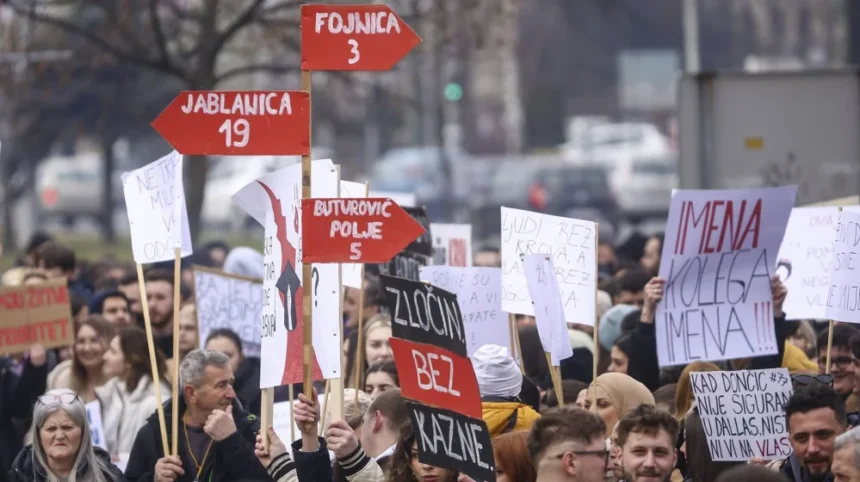SARAJEVO – Students in Bosnia and Herzegovina gathered for a protest today, demanding accountability for the deadly floods of last year. Their demonstration was inspired by the mass anti-corruption protests held by students in neighboring Serbia, reports the Associated Press (AP).
The protests in Serbia began following the collapse of the roof at the Novi Sad train station on November 1, which resulted in 15 deaths. This tragic incident sparked a wave of student-led strikes, road blockages, and protests throughout the Balkans, a region still recovering from the wars of the 1990s and the dissolution of Yugoslavia. Solidarity for the Serbian students was also expressed in Montenegro, Croatia, and Slovenia.
As the AP highlights, the effectiveness of the protests in Serbia lies in their scale—thousands of students and other citizens have joined the demonstrations, showing persistence in demanding change. “As we see in Serbia, their protests are effective because they are massive—people join in and they are persistent,” said Shumeja Duraković, a student from Sarajevo.
The protests reflect a broader sentiment of frustration across the Balkans, particularly in countries like Serbia, Bosnia, and Montenegro, which are struggling with widespread corruption, incompetent governance, and slow-moving reforms as they strive for European Union membership.
The protests in Serbia ignited after the tragic collapse in Novi Sad, an event that critics have linked to corruption within the government. These protests grew into a broader movement for change, challenging President Aleksandar Vučić, who has ruled Serbia for over a decade. In Bosnia, the students in Sarajevo are calling for justice in response to the October floods that killed 29 people, many of whom perished in a village buried under debris from a nearby quarry that was allegedly built illegally.
In Montenegro, students have launched their own protests, calling for the dismissal of top security officials after two armed attacks in less than three years, which resulted in the deaths of 23 people, including children.
Milo Perović, an organizer of the Montenegrin protests, told AP that it is crucial to follow the “waves of boldness” coming from Serbia. The protests in Montenegro include daily silent blockages lasting 23 minutes, in honor of those killed in armed attacks. Similar to Serbia, students in Bosnia are also paying tribute daily to the victims of the Novi Sad roof collapse.
Lamija Fuka, a student in Sarajevo, stated, “We, as students, can come together and change society and the corrupt system… put an end to all of this.” She added, “It is time to wake up and for young people to finally react to what our political leaders have done to us over the past 30 years.”







